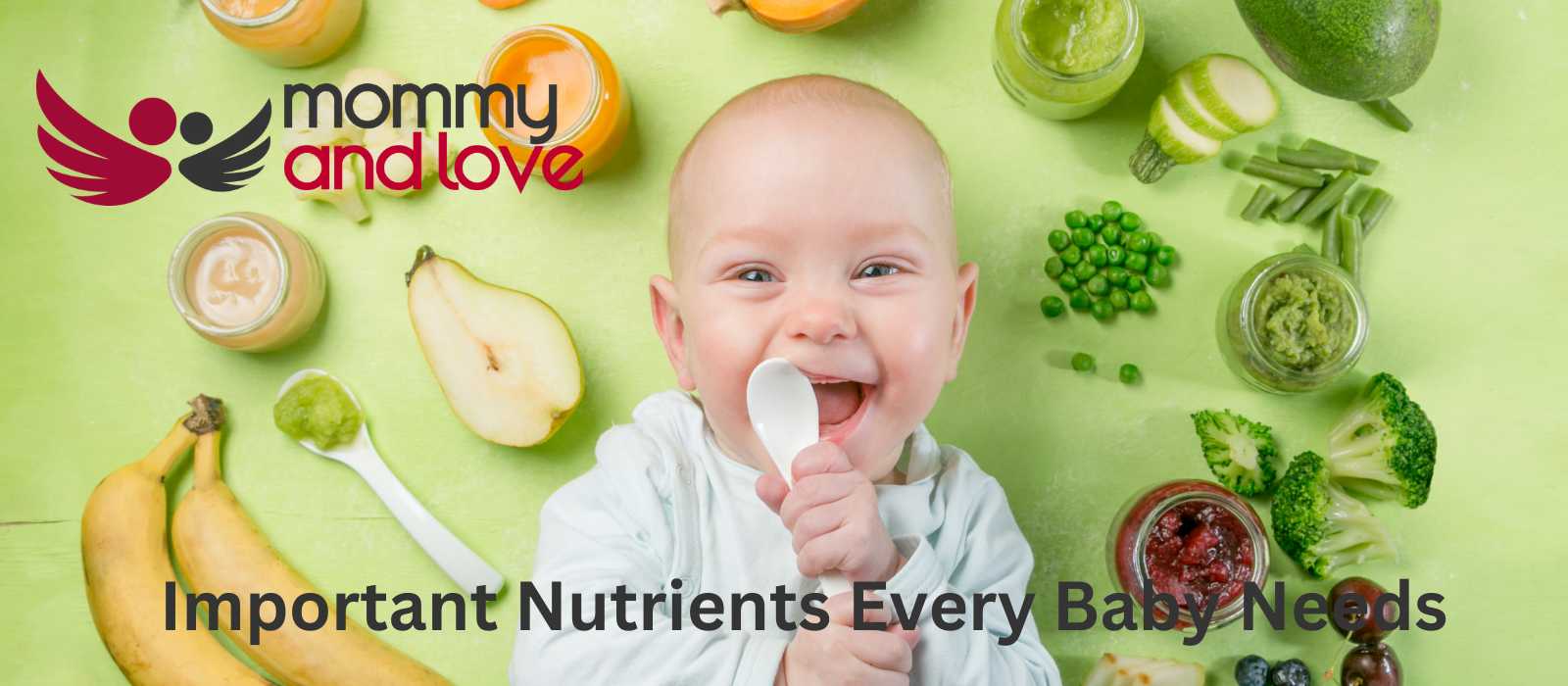Proper nutrition is essential for the proper well-being of your baby. However, adequate nutrition for babies might not be affordable to every parent. Unfortunately, a lack of essential nutrition can cause serious health issues in the long run.

In this article, we will discuss how to make sure your baby is getting the right nutrients with an overview of eight of the best nutrients that every baby needs.
1. Protein

Proteins are the basic building blocks that help your baby grow. They contain all the necessary elements that are required for your baby’s well-being. Proteins also ensure that your baby’s body functions strengthen properly over the course of time.
Adding foods that contain proteins to your baby’s diet is not a difficult process. You can consider adding these foods to your baby’s diet upon approval from your baby’s pediatrician:
- Meat
- Eggs
- Tofu
- Grains
2. Calcium
Calcium is an essential nutrient that your baby requires to develop stronger bones. This element can help your baby prevent rickets and stunted growth. Breast milk is the natural source of calcium for your baby. Feeding formula to your baby can also maintain the levels of calcium.
However, as your baby starts following a proper diet, you have to ensure that your baby consumes foods that contain good levels of calcium. Some of the calcium-rich foods include:
- Whole milk cheese
- Yogurt
- Pulses/dried beans and lentils
- Eggs
3. Fluids

During the first six months, your baby gets their water intake from breast milk. But as they make a transition from breast milk, they will start getting water from foods. Allowing your baby to sip some water is a proper water source for your baby.
However, keep in mind that your baby doesn’t need to drink a lot of water. Increased water intake can be harmful to your baby’s health. This is why you need to administer how much water your baby takes. You should only be giving extra fluids to your baby when temperatures are high.
If a baby drinks excessive amounts of water, it can have a detrimental effect on their overall nutrition intake in the long run. Water is essential for hydration, but infants have relatively small stomachs and limited appetite. If they fill up on water, it can leave less room for nutrient-rich foods. As a result, they may consume fewer calories and essential nutrients, such as proteins, fats, carbohydrates, vitamins, and minerals, which are crucial for their growth and development. It’s important for parents to monitor and ensure that their baby’s water intake is balanced with their solid food consumption to promote optimal nutrition and overall health.
Manage your baby’s water intake so your baby can stay healthy and avoid health problems in the long run.
4. Whole Grains

Your baby will eventually have to shift to whole grains to fulfill their nutritional needs. The good thing about whole grains is that they can provide a balanced combination of proteins and carbohydrates to your baby. Some of the healthy options for whole grain foods that you should consider for your baby are:
- Whole grain cereal
- Whole grain pasta
- Brown rice
- Lentils
- Beans
- Peas
5. Vitamins
Vitamins can boost the immunity of your kids and help them avoid health problems. They also speed up the process of growth in babies and help them grow up faster. Here are some of the essential vitamins every kid needs:
- Vitamin A
- Vitamin B
- Vitamin C
- Vitamin E
These essential vitamins are responsible for proper brain development, boosting eyesight, and improving skin health. The best way of providing these vitamins to your baby is by preparing a diet for them that contains carrots, potatoes, bananas, beans, tomatoes, strawberries, and cereals.
6. High-Fat Foods
Babies obtain cholesterol and fats from breast milk or bottle feeding. However, as they progress from milk to a solid food diet, it becomes necessary to ensure that their food intake includes adequate amounts of fats.
Monitoring and maintaining proper fat intake is crucial for promoting the healthy growth of your baby. One straightforward approach to providing sufficient fats to your baby is by incorporating dairy products made from whole milk into their diet. Additionally, cooking food items in olive oil can help ensure that your baby’s diet doesn’t lack essential fats.
7. Omega-3
Omega-3 fatty acids boost brain and vision development. These fatty acids are naturally present in breast milk.
However, as your baby transitions away from breast milk, you have to ensure that the foods in their diet contain proper levels of Omega-3. Some of the foods that you can add to your baby’s diet to provide Omega-3 are:
- Fish
- Tofu
- Eggs
- Flaxseed
- Canola Oil
8. Iron

The presence of proper levels of iron in your baby is necessary for their wellbeing. Iron is responsible for the production of hemoglobin, which is responsible for making oxygen available in all parts of the body. Iron is also necessary for the neurological development of your baby.
You will need to administer a source of iron for your baby if your baby isn’t relying on a fortified formula. The pediatrician will either recommend giving a supplement containing iron or recommend providing foods to your baby that contain iron. Some of the iron-rich food recommendations are:
- Meat
- Egg yolks
- Whole grain
- Cooked dried peas




